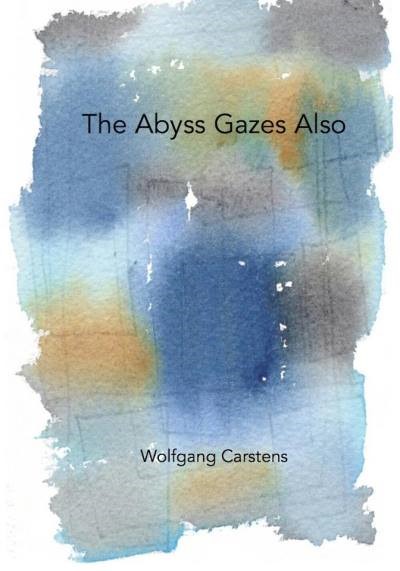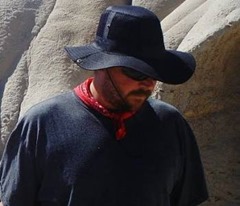A nervous young man climbed up behind a microphone and read his poem, hesitantly, inaudibly. The poem done, he took his seat. The audience clapped, quietly, politely. Wolf Carstens, the evening’s host, moved behind the microphone, brought his hands together, once, twice, then, jack-hammer loud. He gave the young man a personal standing ovation, raved about his words, his courage—this being the young man’s first reading—and before he was done the young poet was beaming in his chair. Resurrected. Brought back into the human circle.
Wolf Cartens is a poet, and, he’s a poet of life. Engages context, pierces pretexts, knows when right is right.
He, along with special guests, will be reading, May 27th at Ground Zero.
His new book is called The Abyss Gazes Also, and here are my thoughts:
and here are my thoughts:
The Abyss Gazes Also is a formidable book. It’s an underground book, dark, sometimes feral. A book with teeth and torn flesh, bones and catacombs. Still, there is humour, edged and skewed; and there is life, quotidian, off kilter and precisely real.
Author Wolfgang Carstens responds to reality without blinking. The result is that every poem is a border experience, testing temporal boundaries without the safety net of an external system of absolutes, and without the use of abstractions. There’s no sleight of hand here. It’s raw-honest work; and to produce it Carstens uses, and uses deftly, only what’s at hand—the mere tools of heart and mind.
Carstens’ poems, like distilled dispatches from the narrow realm on the rim of consciousness, are spare and stripped down. Every word counts. Each poem reveals the power of the author’s concentrated gaze, and so brings its own might and muscle. Yet taken as a whole, there is a small burning flame within, at first, like a rumour. But there’s no circumnavigating. You will have to wade,  slue-footed, through dense smoke and blood-besotted bogs to find its warmth, see its brilliance.
slue-footed, through dense smoke and blood-besotted bogs to find its warmth, see its brilliance.
It’s not merely that light shines twice as bright in a black night, or that madness cracks under the sudden vision of a small green blade, or pops like a soap bubble at the sound of a lover’s voice, it’s that an immediate encounter with the half of life we assiduously avoid, is finally the only way to overcome our rage for numbness and security. The book may not cry, “Awake sleeper!” but it does insinuate. Which may, after all, be more persuasive. Either way, we are in the presence of a rare voice carrying a live message.
And now I can hear echoes of the fifth century St. Benedict, “Keep death before your eyes daily.” Or as Carstens says in the poem titled Life Is, “Live to the point of tears.” These follow one another; they are two ways of saying one crucial thing.
And here we can approach the alluded to quote by Friedrich Nietzsche, “…if you gaze into the abyss, the abyss gazes also into you.” On one hand a warning, on the other a touchstone. Nietzsche had no patience for the herd, for the dabbler, tourist, voyeur.
And let’s be frank, for such as these, Carstens’ book will not appeal. However, for the prophet, poet, disciple, contemplative, for all those desiring the dance going on at the cliff edge, this book will resound. For the abyss—while always a present danger, threatening possession, absurdity, psychosis—is a part of reality for which ultimately there is no avoidance. All there is, are ways of engagement, ways of gazing.
And Wolfgang Carstens, as is apparent over and over again in these poems, has spent not a little time gazing. At times wielding his focus like a rapier. At times reclining in tender regard. At all times, gazing honestly and courageously, as these hard-won poems reveal.
